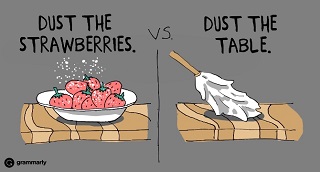Hazards of the Language

I hate to sound like a buzz killer, but why on Earth would anyone want to use a word like that? I don’t see the value of a word that is intrinsically confusing; I have enough trouble communicating my exact thoughts with words that actually mean something specific.
Subject: A.Word.A.Day–sententious
Aug 12, 2016
This week’s theme
Contranyms
This week’s words
dabster
salad days
depthless
grog
sententious
Send a gift that
keeps on giving,
all year long:
A gift subscription of A.Word.A.Day or give the gift of books
A.Word.A.Day
with Anu Garg
sententious
PRONUNCIATION:
(sen-TEN-shuhs)
MEANING:
adjective:
1. Full of pithy expressions.
2. Full of pompous moralizing.
ETYMOLOGY:
From Latin sententia (opinion), from sentire (to feel or to have an opinion). Some other words derived from the same root are: sense, sentence, sentiment, sentinel, assent, consent, dissent, and resent. Earliest documented use: 1440.
USAGE:
“Sizzlingly smart and agreeably sententious, Mr. Garland’s film transcends some all-too-human imperfections with gorgeous images, astute writing, and memorably strong performances.”
Joe Morgenstern; Stylish ‘Machina’ Artfully Programmed for Pleasure; The Wall Street Journal (New York); Apr 10, 2015.
“In [Walden’s] first chapter, ‘Economy’, Thoreau lays out a program of abstinence so thoroughgoing as to make the Dalai Lama look like a Kardashian. (That chapter must be one of the highest barriers to entry in the Western canon: dry, sententious, condescending, more than eighty pages long.)”
Kathryn Schulz; Pond Scum; The New Yorker; Oct 19, 2015.
See more usage examples of sententious in Vocabulary.com’s dictionary.
A THOUGHT FOR TODAY:
People share a common nature but are trained in gender roles. -Lillie Devereux Blake, novelist, essayist, and reformer (12 Aug 1833-1913)
Your thoughts about today’s word? Click here to share.
Or you can email us at words@wordsmith.org.
Unsubscribe | Subscribe | Update address | Gift subscription | Contact us
© 1994-2016 Wordsmith.org

Craig, memory can be such an unusual thing. I recall images from a time before language, I will recall philosophical conversations, their settings, people present and their moods from long ago, but a word a day like most language studies seems a bit beyond me. Good for you.
As to why anyone would use a word with two disparate meanings we could look at the way communication is often contextual. When we look for a list of contronyms it shows more than a few very common words. http://mentalfloss.com/article/49834/14-words-are-their-own-opposites
Part of the explanation suggests that the meanings may have come from different sources and that context will usually allow us to determine what is intended.
But to your point there are also situations where two opposite meanings may be intended. Humor would be one example. Another would be poetry, or using language in a poetic fashion. But certainly in instances of technical writing where an exact meaning is intended it would be good to know something of these words so they might be avoided or at least used with caution.
Thanks for the interesting post.
You’re right. Most contronyms aren’t ambiguous to the reader who’s fluent with the language. But some are, like the example I used (“depthless”).
Good point.